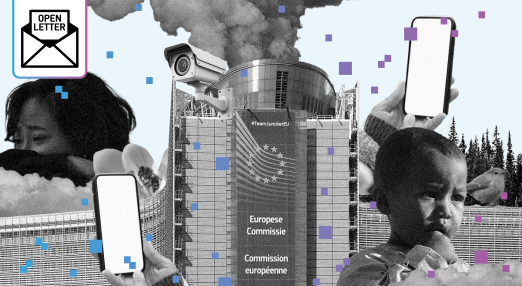Privacy and confidentiality
Privacy is a crucial element of our personal security, enabling free speech and democratic participation. The absolute and fundamental human right to privacy guarantees people respect for their private life and freedom from snooping and unlawful interference. It gives everyone the freedom to be themselves, to express and develop their opinions and ideas with dignity, and to practice their religion, as well as giving journalists and civil society the ability to report on violations of rights by states or businesses. Without sufficient privacy, people’s private interactions are exposed, which can be used to target or discriminate against them.
Filter resources
-

How Danes je nov dan helped stop dangerous spyware in Slovenia
EDRi affiliate Danes je nov dan launched a multi-faceted campaign in response to a government proposal that would allow the Slovene Intelligence and Security Agency (SOVA) to use invasive spyware and mass surveillance tools under the guise of “national security”. By combining a satirical online tool with targeted advocacy towards lawmakers, their efforts helped generate critical pressure needed to stop the legislation from being adopted.
Read more
-

CSA Regulation Document Pool
This document pool contains updates and resources on the EU's proposed 'Regulation laying down rules to prevent and combat child sexual abuse' (CSA Regulation)
Read more
-

When data relate to us
The EDPS vs. Single Resolution Board judgment goes to the heart of the EU’s fundamental right to data protection, shaping how artificial intelligence, data spaces and so-called privacy-enhancing technologies (PETs) will be governed in practice. The ruling of the Court of Justice of the European Union (CJEU) arrives at a crucial time to reiterate what counts as personal data, reinforcing the importance of the protection that the GDPR was designed to guarantee.
Read more
-

Europe is dismantling its digital rights from within
The European Commission’s new Digital Omnibus is presented as simple “streamlining”, but in practice it dismantles key safeguards in the GDPR, ePrivacy rules and the AI Act. It would make access to device data easier, weaken limits on automated decision-making and lower protections against discriminatory AI.
Read more
-

Press Release: Commission’s Digital Omnibus is a major rollback of EU digital protections
Today the European Commission has published two Digital Omnibus proposals, reopening the EU’s core protections against harm in the digital age. This step risks dismantling the rules-based system that was hard-won over decades, endangering the very foundation of human rights and tech policy in the EU.
Read more
-

A Privacy Nightmarе: Understanding Spyware, a new book by SHARE Foundation
SHARE Foundation’s new book ‘A Privacy Nightmare: Understanding Spyware’ examines spyware through technical, legal, and practical lenses, offering a systemic understanding of its threats and reinforcing the call for a global ban.
Read more
-

Deregulating digital rights: Why the EU’s war on ‘red tape’ should worry us all
The European Commission has made deregulation a top priority for the EU over the next four years. Under the banner of ‘simplifying’ EU rules, we risk seeing the entire digital rulebook – for which we have advocated for years – being stripped away. If the EU wants a healthy, competitive tech market that puts people at its center, then this deregulation push is not only bad for the protection of fundamental rights, but is also an act of self-sabotage which must be reversed.
Read more
-

Open Letter: The EU weakens the rules that safeguard people and the environment
470 civil society society organisations, trade unions and public interest groups are making it clear to European Commission President Ursula von der Leyen, European Commissioners and EU Member States that our rights, planet, health and justice are not for sale. They call on EU lawmakers to protect and promote the rights enshrined in the EU Charter and international human rights law, instead of endangering them.
Read more
-

Denmark wants to break the Council deadlock on the CSA Regulation, but are they genuinely trying?
Denmark made the widely-criticised CSA Regulation a priority on the very first day of their Council presidency, but show little willingness to actually find a compromise that will break the three-year long deadlock on this law. The Danish text recycles previous failed attempts and does nothing to assuage the valid concerns about mass surveillance and encryption. Not only is Denmark unlikely to be able to broker a deal, it also stands in the way of EU countries finding an alternative, meaningful, rights-respecting solution to tackling CSA online.
Read more
-

16 countries burned Poland’s bridges on the CSA Regulation: What now?
Poland’s surprising compromise to ease the deadlock on the CSA Regulation – which has been stuck in the Council of EU Member States for the past three years – met with failure. This blog recaps the Polish compromise, the positions of the Member States on the proposal, and what it could mean for the future of one of the most criticised EU laws of all time.
Read more
-

A missed opportunity for enforcement: what the final GDPR Procedural Regulation could cost us
After years of debate, the GDPR Procedural Regulation has been finalised. Despite some improvements, the final text may entrench old problems and create new ones, undermining people’s rights and potentially opening the door to weakening the GDPR itself.
Read more
-

All Eyes on my Period? Period tracking apps and the future of privacy in a post-Roe world
Privacy International investigated eight of the most popular period-tracking apps to analyse how they function and process users’ reproductive health data. Their findings raised concerns for users’ privacy, given the sensitive nature of the health data involved. These findings come within the context of the global roll back on reproductive rights and fears over law enforcement forcing apps to hand over data.
Read more
